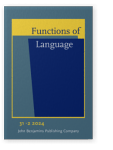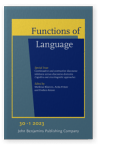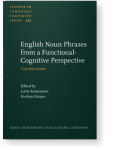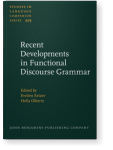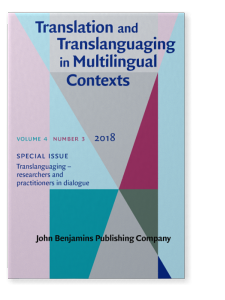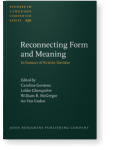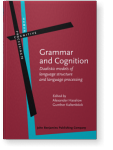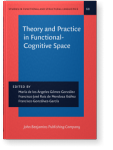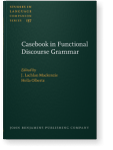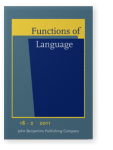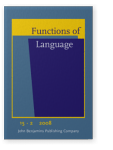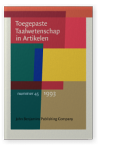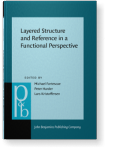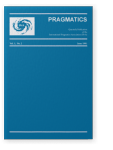Evelien Keizer
List of John Benjamins publications for which Evelien Keizer plays a role.
Journal
Continuative and contrastive discourse relations across discourse domains: Cognitive and cross-linguistic approaches
Edited by Matthias Klumm, Anita Fetzer and Evelien Keizer
Special issue of Functions of Language 30:1 (2023) v, 135 pp.
Subjects Corpus linguistics | Discourse studies | Functional linguistics | Pragmatics | Theoretical linguistics
English Noun Phrases from a Functional-Cognitive Perspective: Current issues
Edited by Lotte Sommerer and Evelien Keizer
[Studies in Language Companion Series, 221] 2022. vii, 433 pp.
Subjects English linguistics | Germanic linguistics | Morphology | Syntax | Theoretical linguistics
Recent Developments in Functional Discourse Grammar
Edited by Evelien Keizer and Hella Olbertz
[Studies in Language Companion Series, 205] 2018. ix, 283 pp.
Subjects Discourse studies | Functional linguistics | Pragmatics | Theoretical linguistics
Outside the Clause: Form and function of extra-clausal constituents
Edited by Gunther Kaltenböck, Evelien Keizer and Arne Lohmann
[Studies in Language Companion Series, 178] 2016. vi, 450 pp.
Subjects Discourse studies | Phonology | Pragmatics | Semantics | Syntax | Theoretical linguistics
The interaction between context and grammar in Functional Discourse Grammar
Edited by Nuria Alturo, Evelien Keizer and Lluís Payrató
Special issue of Pragmatics 24:2 (2014) ca. 125 pp.
Subjects Discourse studies | Pragmatics
2023 Chapter 10. Enation and agnation in multi-level models: The case for Functional Discourse Grammar Reconnecting Form and Meaning: In honour of Kristin Davidse, Gentens, Caroline, Lobke Ghesquière, William B. McGregor and An Van linden (eds.), pp. 267–298 | Chapter
Gleason’s (1965) distinction between enation (same structure, different lexemes) and agnation (different structure, same lexemes) has proved to be a crucial one for theoretical linguistics, and over the last decades functional and cognitive linguists have made important contributions to the… read more
2023 Continuative and contrastive discourse relations across discourse domains: Cognitive and cross-linguistic approaches Continuative and contrastive discourse relations across discourse domains: Cognitive and cross-linguistic approaches, Klumm, Matthias, Anita Fetzer and Evelien Keizer (eds.), pp. 4–15 | Introduction
2022 Premodification in X-is constructions: Fact and point English Noun Phrases from a Functional-Cognitive Perspective: Current issues, Sommerer, Lotte and Evelien Keizer (eds.), pp. 235–276 | Chapter
Although most studies on the X-is construction (thing-is, fact-is, point-is, etc.) acknowledge that premodification is allowed, very little attention has been paid to this property of the construction. Focusing on instances with the head nouns fact and point, this paper seeks to find out which… read more
2022 Major trends in research on the English NP English Noun Phrases from a Functional-Cognitive Perspective: Current issues, Sommerer, Lotte and Evelien Keizer (eds.), pp. 1–24 | Chapter
2020 Chapter 6. The semantics, syntax and prosody of adverbs in English: An FDG perspective Grammar and Cognition: Dualistic models of language structure and language processing, Haselow, Alexander and Gunther Kaltenböck (eds.), pp. 191–232 | Chapter
In the extensive literature on parenthetical (non-propositional, disjunctive) adverbs, it is often assumed that, on the basis of their semantic, syntactic and prosodic properties, a binary distinction can be made between integrated (non-parenthetical) and non-integrated (parenthetical) adverbs.… read more
2018 Interpersonal adverbs in FDG: The case of frankly Recent Developments in Functional Discourse Grammar, Keizer, Evelien and Hella Olbertz (eds.), pp. 47–88 | Chapter
The aim of this chapter is to present an FDG analysis of interpersonal adverbs like frankly, fortunately and briefly. Although the literature on these adverbs (also referred to as parenthetical, disjunctive, or comment adverbs) is extensive, and their discourse-pragmatic functions and semantic… read more
2018 Functional Discourse Grammar: A brief outline Recent Developments in Functional Discourse Grammar, Keizer, Evelien and Hella Olbertz (eds.), pp. 1–16 | Chapter
2016 Extra-clausal constituents: An overview Outside the Clause: Form and function of extra-clausal constituents, Kaltenböck, Gunther, Evelien Keizer and Arne Lohmann (eds.), pp. 1–26 | Article
2016 The (the) fact is (that) construction in English and Dutch Outside the Clause: Form and function of extra-clausal constituents, Kaltenböck, Gunther, Evelien Keizer and Arne Lohmann (eds.), pp. 59–96 | Article
This paper deals with a frequently used construction in English and Dutch which can be broadly described as the (DET) (adj) fact is (that) construction. Using authentic data, it starts by presenting a detailed discussion of the differences and similarities between the English and the Dutch… read more
2014 The interaction between context and grammar in functional discourse grammar: Introduction The interaction between context and grammar in Functional Discourse Grammar, Alturo, Nuria, Evelien Keizer and Lluís Payrató (eds.), pp. 185–201 | Article
2014 Derivational morphology in Functional Discourse Grammar Theory and Practice in Functional-Cognitive Space, Gómez González, María de los Ángeles, Francisco José Ruiz de Mendoza Ibáñez and Francisco Gonzálvez-García (eds.), pp. 151–176 | Article
The aim of this paper is to provide a general overview of derivational morphology
in Functional Discourse Grammar (FDG) as presented in Hengeveld and
Mackenzie (2008). The paper begins with a brief description of the model with
special reference to those properties which are relevant in the… read more
2014 Context and cognition in Functional Discourse Grammar: What, where and why? The interaction between context and grammar in Functional Discourse Grammar, Alturo, Nuria, Evelien Keizer and Lluís Payrató (eds.), pp. 399–423 | Article
This paper discusses a recurring problem in the development and application of models of grammar: That of deciding which linguistically relevant contextual information forms part of (i.e. enters) the grammar, and which contextual information interacts with the grammar without being part of it.… read more
2013 The X is (is) construction: An FDG account Casebook in Functional Discourse Grammar, Mackenzie, J. Lachlan and Hella Olbertz (eds.), pp. 213–248 | Article
The aim of this chapter is to propose a Functional Discourse Grammar analysis of constructions of the form (the) {thing/point/fact etc.} is (is) (that) that reflects both the semi-fixed nature of these constructions and their specific discourse-pragmatic functions. First, it is argued that the… read more
2008 English prepositions in Functional Discourse Grammar Functions of Language 15:2, pp. 216–256 | Article
Adpositions have always been problematic in terms of analysis and representation: should they be regarded as lexical elements, with an argument structure, or as semantically empty grammatical elements, i.e. as operators or functions? Or could it be that some adpositions are lexical and others… read more
1992 Predicates as Referring Expressions Layered Structure and Reference in a Functional Perspective: Papers from the Functional Grammar Conference, Copenhagen, 1990, Fortescue, Michael, Peter Harder and Lars Kristoffersen (eds.), pp. 1–28 | Article
1991 On assigning pragmatic functions in English Pragmatics 1:2, pp. 169–215 | Article
This paper presents a discussion of the treatment of the pragmatic functions Topic and Focus in Functional Grammar (Dik: 1989, ch. 13). Two questions will be addressed: (a) the theoretical question of how the interface between the static grammar (dealing with a discourse as the product of… read more
